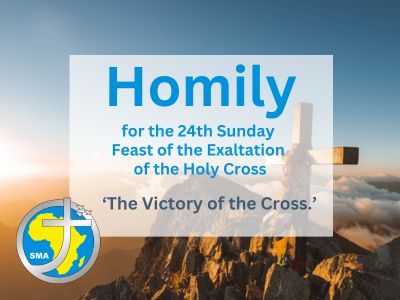Feast of the Exaltation of the Holy Cross
Readings: Numbers 21:4-9; Philippians 2:6-11; John 3:13-17
Theme: The Victory of the Cross
By Michael McCabe, SMA
The origins of today’s feast, ‘The Exaltation of the Holy Cross’, go back to the discovery of the true cross and the dedication of the Church of the Holy Sepulchre in Jerusalem which took place on the 14th September, 326. Up to that time, Christians had been reluctant to venerate something still in use as an instrument of torture and execution. But when the Roman emperor, Constantine, became a Christian, he abolished crucifixion and adopted the cross as a symbol of victory, clearing the way for Christians to publicly venerate and proclaim it. Thus the cross was transformed in Christian consciousness from something shameful and repugnant into a triumphant symbol of God’s victory over death and sin, and the gift of divine life – as succinctly expressed in the Preface of today’s Eucharist.
The cross also shows us with startling clarity what happens to self-forgetful love in a world ruled by the demons of hatred and violence. Jesus might have avoided the Cross, but only by turning aside from his mission of proclaiming and inaugurating the God’s reign of justice, peace, truth and love. And this he could not and would not do. To reveal the full extent of God’s love for us, he had to endure suffering and death on a Cross – the final phase and climax of his life-giving mission of love, showing, as the fourth Eucharistic prayer reminds us, ‘how perfect his love was’.
Mel Gibson, in his famous movie, The Passion of the Christ, highlights the horrific suffering endured by Jesus during the final twelve hours of his life. Yet, despite its lengthy and detailed portrayal of the violence inflicted on Jesus, his movie is not a true representation of his passion. Jesus’ suffering and death on the Cross cannot be understood apart from the context of his passionate life, lived in obedience to the will of his Father, and poured out in loving service of others, especially the poor and marginalised: proclaiming a message of hope to those longing for liberation, healing of the sick, forgiving sinners, and casting out demons. Jesus death on the Cross was the supreme manifestation of a life of love – the love of one who, as our second reading today reminds us, ‘did not cling to his equality with God but emptied himself to assume the condition of a slave’ (Phil. 2: 6 -7). The Cross was the climax of his mission of loving service. In the words of the English poet, Malcolm Guite:
‘…On this tree
Loss becomes gain, death opens into birth.
Here wounding heals and fastening makes free
Earth breathes in heaven, heaven roots in earth.
And here we see the length, the breadth, the height
Where love and hatred meet and love stays true
Where sin meets grace and darkness turns to light
We see what love can bear and be and do,
And here our saviour calls us to his side
His love is free, his arms are open wide.’
The Cross, as the noted Dominican theologian, Herbert McCabe, reminds us, reveals ‘the weakness of God…, not the weakness of ineffectiveness but the weakness of love, which is our best picture of the power of God. From creation itself right through to redemption the power of God is exercised not in manipulating and interfering with things but in letting them be, because the power of God is the power of love’. It is, however, only through the lens of the resurrection that we come to see the weakness of divine love in our world, not as a tragic defeat, but as a glorious victory. To quote again from that wonderful hymn in our second reading: ‘But God raised him high and gave him the name which is above all other names, so that all beings in the heavens, on earth and in the underworld… should acclaim Jesus as Lord, to the glory of God the Father’ (Phil. 2: 9 -11)
The message for us in today’s readings is perfectly expressed in these words of Pope Francis: ‘From the cross of Christ we learn love, not hatred; compassion, not indifference; forgiveness, not vengeance. The outstretched arms of Jesus are the embrace of tender love with which God wishes to embrace us. They show us the love that we are called to have for one another and for everyone. They show us the way, the Christian way. It is not the way of imposition and force, of power and status; it never brandishes the cross of Christ against our brothers and sisters for whom he gave his life! Jesus’ way, the way of salvation is different: it is the way of a humble gratuitous and universal love, with no “ifs”, “ands” or “buts”’. This is surely a message we all need to take to heart, as we strive to be faithful disciples of Jesus in a world still troubled by the demons of hatred and violence.
Listen to an alternative audio Homily by Tom Casey, SMA:

